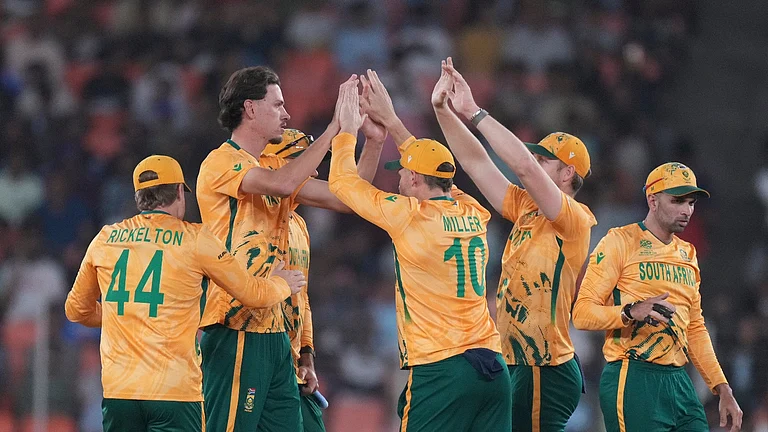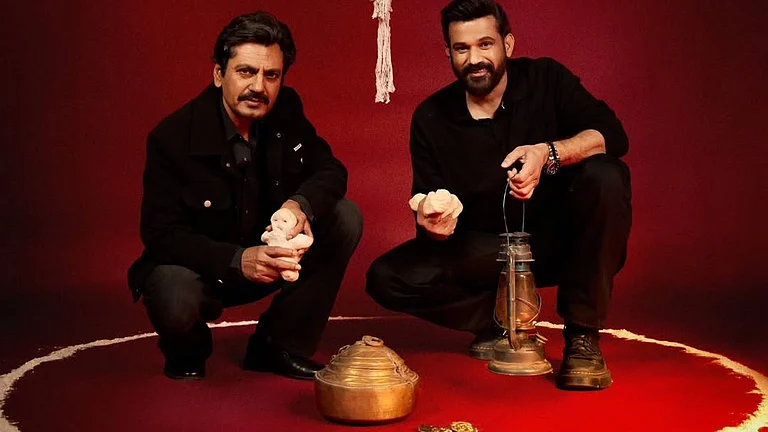In the midst of a swinging music session at the Shaurya Centre in Palwal (Haryana) on the Delhi-Agra highway, a pair of eyes kept looking at me, smiling all the time. No words. Then an arm reached out from the same place, across a table, toward me. We were in the midst of singing many songs, including some tributes to Lata Mangeshkar, like ‘Ae Merey Watan Kay Logo’, and also some peppy Kishore Kumar songs. What did Yogesh want? I wasn’t sure for he didn’t speak a word. I kept playing my small harmonica, working it out in the whirl of music. I had four more harmonicas tucked away in a boxbag.
It struck me that Yogesh ji wanted the harmonica. So, I pulled one out from the bag and gave it to him. And we went ‘yaad kiya dil ney kahaan ho tum’; Yogesh played along merrily, not a single note out of line. One of the twelve ‘young men’ at the Shaurya Centre, Yogesh was diagnosed with cerebral palsy, a neuromuscular disorder during his childhood. His physical age is 55. The rest of the boys, mostly autistic, are in the age group 15-35. Shaurya Centre is headed by Arpita Yadav, who has a 21-year-old son with multiple challenges, Nirbhay. It’s been running, in fits and starts due to the pandemic, for over two years now.
I was at the centre, along with my mother, to meet my son Abhimanyu, who will turn 29 this March. He joined the centre on 2nd January this year. It is his first major step toward independent adulthood, apart from a brief two-week stint at Arunima, a centre for adult autistic people in Dehradun, almost ten years back.
Just a few days earlier, Abhimanyu had surprised us during a Zoom call on my wife Shubhra’s birthday. He had wished her with a full sentence, ‘Happy birthday to you,’ a rare occurrence for him for he is mostly a two-three-word formula person: khaana khaana hai, paani peena hai, gaadi mein jaana hai, swimming karna hai, roller skating hai, gaana sunna hai.
That last, gaana, has been a major feature of our life with Abhimanyu and his autism. My mother teaches Carnatic vocal music, and she has been singing to Abhi right from his birth, even before his autism became known.
Apart from this, Shubhra and I have always been part of a large circle of friends who sing, and sing, and sing, and play the guitar, and the harmonica, on most weekends. Some of these friends in Delhi and Gurgaon have autistic children/young adults, too.
We had joined the merry band on Sunday (February 6) during lunchtime. Since it was the day Lata ji had passed away, we began singing tributes to her after lunch. Arpita and Team Shaurya joined in, too. A party mood developed. Abhijay from Mashobra near Shimla and Aaditya from GK in Delhi, known for their singing, led the pack. It was not all superlative singing, but it had got heart, spirit and soul.
We’re all conscious of our challenges, no one more so than our merry band of youngsters. So, Amma’s old-worldly but time-tested tactic is to go into all the schoolprayer-like songs: ‘Hum ko mann ki shakti dena’ etc. But Abhijay was intent on Lata too, so we suddenly broke into, ‘Ae merey watan kay logo’. And then it was Bhupen Hazarika and ‘Ganga’. And then, as we were losing steam, Yogesh reached out to me. Everyone was charged up all over again as Yogesh began playing, non-stop. Till we all got tired. Team Shaurya was amazed; they had never seen Yogesh so alive.
Winding up, we took pictures and went back home. I’m still absorbing the enormity and the significance of what happened in chats with Arpita on phone and on WhatsApp. I posted my experience on the Shaurya parents/guardians’ WhatsApp group. Yogesh’s sister, Sangeeta, shared he had been playing harmonica non-stop, asking for me and ‘Daadi’.
It turned out Yogesh’s parents had put him into tabla, harmonium and singing, but he had to discontinue due to low concentration levels. He, however, continued playing harmonica in his free time. He cycled and listened to music on the Walkman and radio. “After that epilepsy attacked him, reducing his functionality,” Sangeeta said. Yogesh had attended a few residential schools, but his age had become a factor. At Shaurya, he is back to playing harmonica. To me, the singing session with the specially-abled at Shaurya proved yet again: Music is there in all of us, we just need to find it.
(Madhusudan Srinivas is a senior journalist and writer. He has worked in print and television for well over three decades. Being the father of a 29-year-old boy with autism, he is an inclusion advocate. Views expressed in this article are personal and may not necessarily reflect the views of Outlook Magazine.)





















